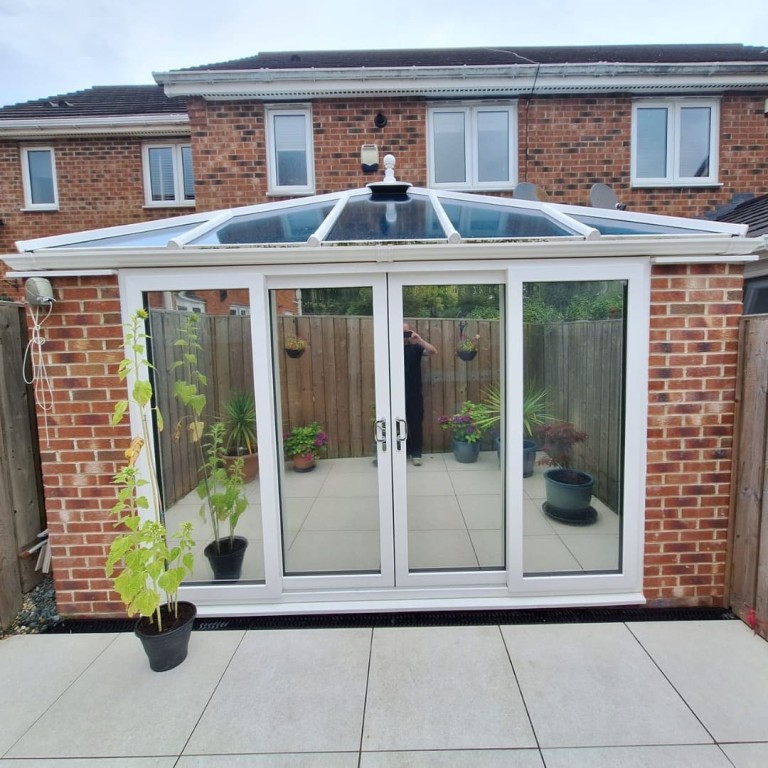Energy Saving / Insulation
Whilst one side of you building can suffer from huge solar heat gains the opposite side of the building can be suffering from heat loss. Tintfit’s range of Low E coated insulation films, can offer the benefits of solar films by reducing incoming solar heat and glare in the summer, whilst also reducing the heat loss through glass in the winter by up to 30%.
These films have a reflective finish and can range from being very dark to give a level of privacy to very light and virtually undetectable once installed. The films can achieve energy cost savings of over 10% and have a typical payback of 3-5 years!
Buy Insulation Window Film: Elevate Your Energy-Saving Game
Explore our range of high-quality insulation window films designed to boost your home's energy efficiency. Choose from our selection tailored to meet your specific needs.
Key Features:
Low E Coating: Integrated with advanced Low E coating technology for superior performance.
Solar Heat Reduction: Achieve over 10% energy cost savings through effective solar heat reduction.
Year-Round Comfort: Experience enhanced comfort with up to 30% reduction in heat loss through glass in winter.
Low E Window Film Technology
The Low E Window Film technology employs microscopically thin metallic coatings to effectively control heat transfer through windows. These metallic coatings, often composed of materials like silver or nickel, are applied to the film's surface. Their strategic distribution on the film acts as a barrier, regulating the passage of thermal radiation while allowing visible light to pass through.
This microscopic layer of metallic coatings efficiently reflects solar heat back to its source during periods of intense sunlight. The low emissivity of these coatings is particularly crucial, playing a key role in maintaining a stable indoor temperature. By minimising heat loss through windows, this technology significantly reduces reliance on heating or cooling systems, contributing to sustainable energy efficiency.
Energy Saving Glass Film: Unveiling the Advantages
The advantages of energy-saving glass film extend beyond typical solutions:
Substantial Cost Savings: Our films can achieve energy cost savings of over 10%, offering a typical payback period of 3-5 years.
Solar Heat and Glare Reduction: Enjoy benefits similar to solar films by reducing incoming solar heat and glare during the summer months.
Winter Heat Retention: Minimise heat loss through glass in winter, contributing to a more energy-efficient home.
Installation: Thermal Insulation Film for Windows
Professional Precision: Opt for professional installation for flawless application and optimal performance.
DIY Enthusiast Installation: For hands-on enthusiasts, our thermal insulation films are available for DIY installation. Follow comprehensive instructions and utilise provided tools for professional-quality results at your own pace.
How long does window insulation film last?
The manufacturer guarantees a 6-year warranty for Insulation Window Film. Please note that the actual lifespan is influenced by installation quality and usage conditions. We are committed to delivering durable and effective products at Tintfit Window Films.
Choose Tintfit Window Films for top-notch insulation solutions. Explore our selection today to make a smart investment in your home's energy performance.
-
Yes, window film can effectively contribute to keeping cold out. High-quality window films, especially those designed for insulation and thermal control, act as a barrier against cold air infiltration. They provide an additional layer of insulation, reducing heat transfer through windows and minimising drafts. This results in improved energy efficiency and a more comfortable indoor environment by helping to retain heat during colder periods.
-
Certainly, window insulation film is proven to be effective. Window insulation film effectively utilises advancements in material science and nanotechnology. These films often incorporate low emissivity coatings, such as metallic layers of silver or nickel, strategically applied to regulate thermal radiation. By minimising heat transfer and providing an extra layer of insulation, these technologies contribute to energy efficiency, reducing heat loss and drafts. Practical applications and studies, like those conducted by the Lawrence Berkeley National Laboratory, confirm the tangible benefits of window insulation film in enhancing indoor comfort and conserving energy.
-
Yes, window film indeed reduces heat. High-quality window films, equipped with advanced technologies like low emissivity coatings, effectively control the transfer of thermal radiation. These films act as a barrier, reflecting a significant portion of solar heat back to its source during periods of intense sunlight. By minimising heat absorption and improving insulation, window films contribute to a cooler indoor environment, reduce the reliance on air conditioning systems, and enhance overall energy efficiency.
-
No, window insulation film does not cause condensation. Advanced window insulation technologies, including low emissivity coatings, are designed to regulate temperature and prevent moisture buildup. These films create a thermal barrier that reduces the likelihood of condensation by maintaining a consistent temperature on the glass surface.
Proper installation and adherence to recommended guidelines further ensure that window insulation film enhances energy efficiency without introducing condensation issues.
-
Yes, window insulation film is effective on double glazing. The film enhances the thermal performance of double-glazed windows by providing an additional insulating layer. It works by minimising heat transfer, reducing drafts, and enhancing overall energy efficiency.
When applied correctly, window insulation film can complement the existing insulation of double-glazed windows, contributing to better temperature control, increased comfort, and improved energy conservation.
-
Certainly, window insulation film is beneficial in summer. The film, equipped with advanced technologies like low emissivity coatings, effectively reflects a significant portion of solar heat, reducing heat gain through windows. By minimising solar heat absorption, window insulation film helps maintain a cooler indoor environment. This results in reduced reliance on air conditioning systems, improved energy efficiency, and enhanced overall comfort during warmer months.
-
Certainly, Low-E window films are effective. These films, incorporating low emissivity coatings, are designed to control heat transfer through windows. The technology allows the film to reflect a substantial portion of solar heat back to its source while permitting visible light to pass through. This significantly reduces heat absorption, enhances insulation, and contributes to improved energy efficiency.
Numerous practical applications and studies affirm the efficacy of Low-E window films in maintaining a stable indoor temperature, reducing energy consumption, and enhancing overall comfort.
-
The cost of Low-E window coating typically starts at £15.00 per square metre. Additionally, it's important to consider the installation cost, which varies based on factors such as the size of the windows and the complexity of the installation process. Professional installation ensures proper application, maximising the effectiveness of the Low-E coating. For an accurate quote, it is recommended to consult with installation professionals who can provide a tailored estimate based on specific requirements and the scope of the project.
-
Thermal insulation film is a technologically advanced solution designed to improve the energy efficiency of windows. It typically consists of a thin layer of material, often with low emissivity (Low-E) coatings or other insulating properties, applied to the glass surface. This film acts as a barrier, reducing heat transfer through the windows. By minimising heat absorption during warmer periods and preventing heat loss in colder conditions, thermal insulation film helps maintain a more stable indoor temperature. This technology contributes to energy savings, increased comfort, and a more environmentally friendly living or working space.
-
Yes, window insulation film can lead to significant cost savings. The films are designed to enhance energy efficiency by reducing heat transfer through windows. Studies indicate that these films can achieve energy cost savings of over 10%.
The typical payback period for the investment in window insulation film is estimated to be 3-5 years. By minimising the need for heating or cooling systems and improving overall insulation, window insulation films contribute to lower energy consumption and, consequently, reduced utility bills over time.

%20square-768x768.jpg)
